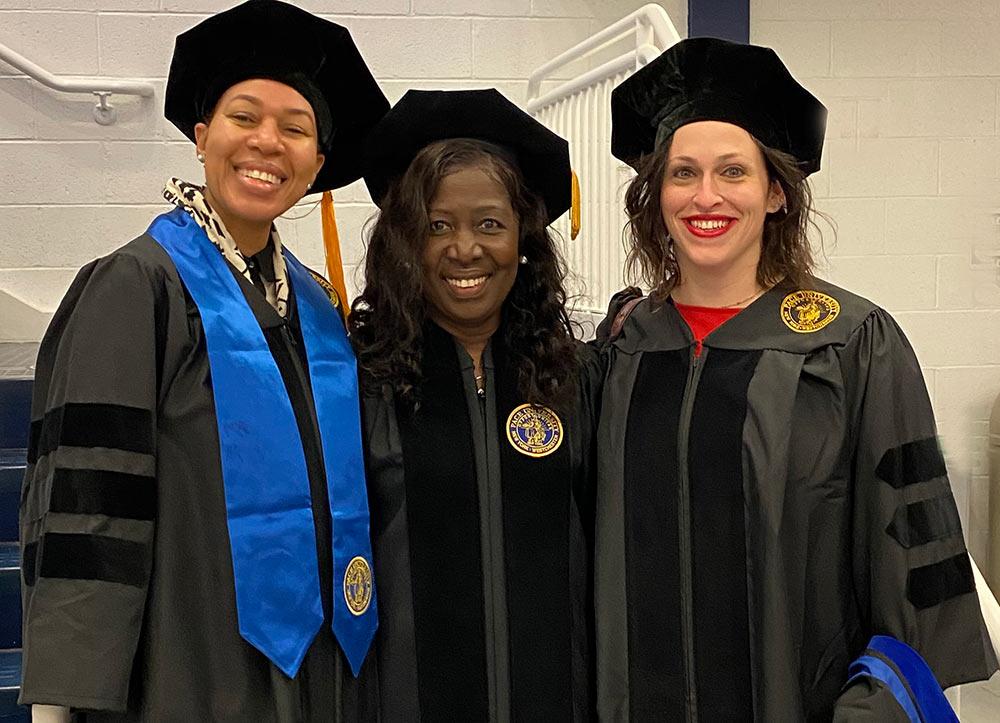
PHD Program Celebrates its First Graduates
In May 2021, Pace University’s College of Health Professions PhD in Nursing Program marked its first commencement ceremony with three graduating students. The graduates, triple Pace alumna Chava Pollak, Michele Flynch, and Delores McGregor were recognized at an in-person hooding ceremony on the Pleasantville Campus attended by PhD faculty, who hooded the graduates. Two to three additional students are anticipated to graduate in August 2021.

The PhD in Nursing is an innovative, research-intensive experience that is the only program of its kind in the mid-Hudson region. This program welcomed its first cohort in fall 2017. The program, which emphasizes research focusing on primary health care, educates students to be nurse scientists. Sharon Wexler, PhD, RN Professor and Chairperson of the PhD Department, explained, “Our students’ research focuses on the full range of healthcare factors from prevention to treatment of illness. The purpose of our program is to prepare nurses who will be scientists, leaders, and educators.”
"Each graduate is ready to conduct research, discover new knowledge that will impact patient care, and become a steward of the profession.” - Sharon Wexler, PhD, RN, Chair, PhD Department
For Chava Pollak, that research involved the care of older adults and utilizing different technologies to improve their lives. Her dissertation project investigated the impact of robotic pets on social and physical frailty in older adults living at home.
She attributes her success in the program to having an incredible mentor. “I was introduced to Dr. Wexler during my undergraduate years at Pace. Since 2013, she guided me toward a career in nursing research and has been a constant source of support and wisdom ever since. Through Dr. Wexler’s work, I discovered my passion for caring for older adults, a path I’ve continued on ever since.”
According to Pollak, completing the program changed the way she thinks about nursing and the way she thinks as a professional. “I learned tangible skills such as research design, for example, but more importantly, I learned to think like a nurse scholar.
Pace is committed to strong community involvement within all of their programs, a fact that graduate Michelle Flynch recognized. “Having a leader who truly cares about diversity made the experience gratifying,” she said. “I was able to interact and share ideas with women from different racial and ethnic backgrounds.This enriched my knowledge base and broadened my perspectives.” Flynch felt encouraged and empowered through the experience because, she said, her mentor was “honest, knowledgeable, and supportive.” She credits this with contributing to her success in the program and in her research.
Flynch’s study was a qualitative hermeneutic phenomenological study that explored the lived experience of family members with loved ones who had a physical restraint intervention in the ICU. “The faculty community in this program has challenged, inspired and adapted to the needs of the students to create a successful program. I’m very proud of that,” she said. Flynch explained how the program educated her as a nurse scientist, advancing her practice as an educator, researcher, and a provider of care. This program equipped her to work on advocating for policy changes in nursing and health care.
Graduate Delores McGregor conducted a qualitative descriptive study to explore the experiences of family caregivers of children with intellectual disability, living in low socioeconomic communities.
McGregor considers herself fortunate to have had world-renowned qualitative research scientist, Keville Frederickson, EdD, RN, FAAN, founding director of the PhD Program, as her mentor at Pace. Delores explained that Dr. Frederickson’s expertise gave her guidance throughout the program and in her research. “All the faculty members I encountered at Pace University were supportive,” said McGregor.
“Each graduate is ready to conduct research, discover new knowledge that will impact patient care, and become a steward of the profession,” said Wexler. Our graduates are prepared to respond to complex needs related to population health.”